Lifesaving oxygen stations to be installed at 5 main hospitals in Hadramout, Shabwa, Marib and Abyan
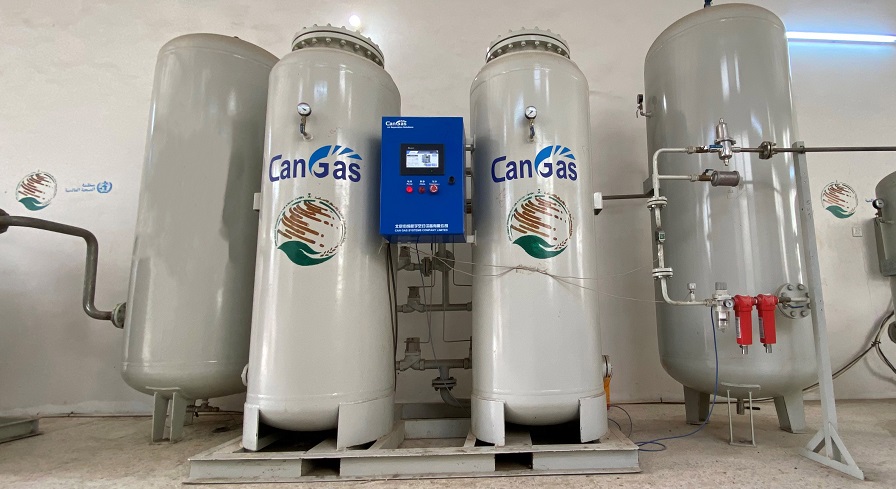
31 May 2022 – The World Health Organization (WHO), in partnership with the King Salman Humanitarian Aid and Relief Centre (KSrelief), will install lifesaving oxygen stations in 5 main hospitals located in priority southern governorates of Hadramout, Shabwa, Marib and Abyan.
The 5 oxygen stations will be a critical support to hospitals for administering anaesthesia and treating critical medical emergencies, including severe cases of COVID-19, major trauma, cardiac arrest and shock. All require an uninterrupted oxygen supply to prevent permanent organ damage or even death of many patients.
“A sustainable oxygen supply has critical importance for operating theatres, intensive care units and COVID-19 treatment centres in hospitals and other health facilities,” said Dr Adham Dr Adham Rashad Ismail Abdel-Moneim, WHO Representative to Yemen. “Health facilities across Yemen often cannot access oxygen supplies due to cost, infrastructure and logistical barriers – resulting in otherwise preventable deaths.”
More than 40 000 seriously ill patients are projected to benefit from these oxygen stations that should be fully installed by September 2022. Upon installing the oxygen stations at all 5 hospitals, WHO will train their personnel to utilize, monitor and maintain them efficiently.
Once installed, the oxygen stations will help meet growing shortages of affordable and sustainable oxygen supplies in Yemen, linked to the country’s ongoing economic and health crisis. This would be one step closer towards ensuring the delivery of sustainable health care services.
“These hospitals and other health facilities face a high influx of under-reported COVID-19 cases and deaths,” said Dr Abdel-Moneim. “The stations will help ensure their functionality and the continuity of essential health services that are primarily focused on COVID-19 case management, trauma care and treatment of respiratory distress.”
Reviewing the minimum services needed for a healthy Yemen
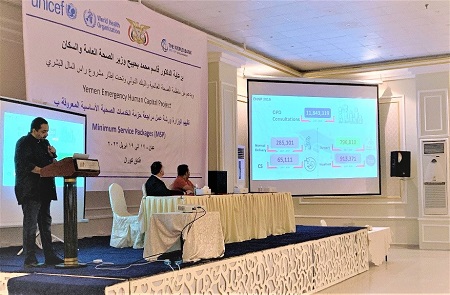 Sana’a and Aden, 29 May 2022 – Every person should have access to the health care they need. That’s why in Yemen, the health authorities, in collaboration with WHO, UNICEF and the World Bank, are reviewing the Minimum Service Package (MSP).
Sana’a and Aden, 29 May 2022 – Every person should have access to the health care they need. That’s why in Yemen, the health authorities, in collaboration with WHO, UNICEF and the World Bank, are reviewing the Minimum Service Package (MSP).
The first MSP was developed in 2017 during a difficult period of intensifying conflict. The package was rapidly developed based on the Disease Control Priorities (DCP3) package and rolled out by the authorities, WHO and UNICEF through the Emergency Health and Nutrition Project with the World Bank’s support, to more than 2000 health facilities in Yemen.
After 5 years of successful implementation, the package is undergoing a rational, needs-based, pragmatic and evidence-based review to determine the essential services required for the health system in Yemen.
The review will update the package of services provided at each level of care (primary, secondary and tertiary) to ensure services are based on the disease burden and relevant to the needs of communities. High-impact interventions will be prioritized, and the package will ensure a continuum of services from prevention through to diagnosis; treatment and rehabilitation is provided at each level of care.
Taking a collaborative, evidence-based approach
The review is currently under way and is expected to be completed by September 2022. Already, the review process has involved intensive consultation, collaboration, engagement and an inclusive approach.
In March and April, workshops with authorities in Sana’a and Aden, brought together more than 100 stakeholders to discuss line-by-line every service offered under the new package. Other stakeholders have also been engaged in thematic discussions on minimum services, complementarity and referrals, which were attended virtually by more than 70 representatives from 30 Health Cluster partners in February. MSP documentation is being made available in Arabic and English to ensure meaningful stakeholder engagement.
In addition, the review is adopting an evidence-based approach, consolidating data from national programmes, the Institute of Health Metrics and Evaluation, and expert experience and validation to better understand the disease burden in Yemen. This analysis has pointed to the importance of continuously strengthening the health information system to ensure reliable data are available to inform policy decisions.
Highlighting the growing burden of noncommunicable diseases in Yemen
For the first time, through the MSP review process, the high burden of noncommunicable diseases (NCDs) in Yemen has been highlighted. This has led to 'quick wins' to tackle the increasing burden of NCDs:
Health authorities have agreed to appoint a full-time NCD focal point to facilitate coordination.
The importance of taking preventive action on NCDs at the primary health care level has been agreed.
The draft MSP 2022 lists human papillomavirus vaccination for girls, hepatitis B birth-dose vaccination, and screening and early detection of common breast and cervical cancers in line with regional and global WHO strategies and goals.
Building a stronger health system
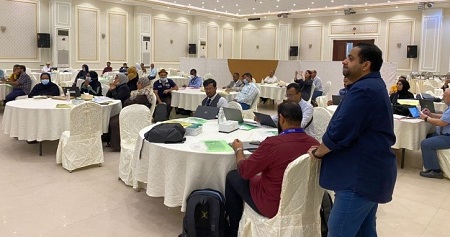 Going forward, for tangible health system strengthening, implementation of the forthcoming MSP will require clear action plans, a spirit of teamwork, more coordination, and ongoing support. The next steps are to compile the outputs from the recent workshops with the authorities, to determine lists of quality standards, essential laboratory services, equipment and medicines for each level of care, and to proceed with costing of the package.
Going forward, for tangible health system strengthening, implementation of the forthcoming MSP will require clear action plans, a spirit of teamwork, more coordination, and ongoing support. The next steps are to compile the outputs from the recent workshops with the authorities, to determine lists of quality standards, essential laboratory services, equipment and medicines for each level of care, and to proceed with costing of the package.
In rolling out the updated package, continuous action will be taken to engage district and governorate health offices and field authorities to conduct domain-specific workshops e.g. on maternal and neonatal health, child health, NCDs and environmental health, and to invest in strengthening the health information system.
EU-funded WHO programme provides vital support to life-saving emergency and trauma care in Yemen
Aden, Yemen 12 May 2022 – With support from the European Civil Protection and Humanitarian Aid Operations (ECHO), the World Health Organization (WHO) has supplied vital training, equipment and supplies that is allowing medical facilities to improve trauma, emergency and blood bank services for thousands of Yemeni citizens in conflict zones.
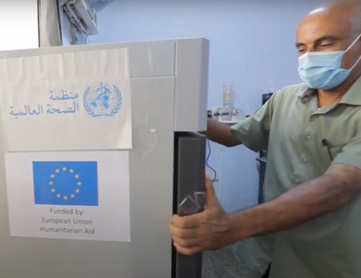 Dr Edries with a new refrigerator for blood supplies“The armed conflict in Yemen has intensified the country’s deep need for emergency and trauma care, especially for people in conflict zones,” said Dr Adham Rashad Ismail, WHO Representative in Yemen. “In the past year, with ECHO’s support, we have trained paramedics and provided essential equipment to trauma teams and blood banks. These efforts have been life-saving in communities across Yemen.”
Dr Edries with a new refrigerator for blood supplies“The armed conflict in Yemen has intensified the country’s deep need for emergency and trauma care, especially for people in conflict zones,” said Dr Adham Rashad Ismail, WHO Representative in Yemen. “In the past year, with ECHO’s support, we have trained paramedics and provided essential equipment to trauma teams and blood banks. These efforts have been life-saving in communities across Yemen.”
Under the ECHO-funded WHO programme, a new trauma centre was built in Hajjah governorate to increase capacity to treat wounded or injured people. In collaboration with Yemen’s Ministry of Public Health and Population, WHO also trained 113 front-line health care workers in pre-hospital management of trauma patients. The training, aimed at increasing treatment capacity in high-risk areas, targeted health care workers in the conflict regions of Ibb, Taiz, Albayda, Hajjah, Hodeidah, Amran and Sa’dah governorates.
With ECHO funds, WHO has provided technical support to trauma teams who performed more than 7400 surgeries in hospitals in Hodeidah, Ibb and Aden governorates in 2021. In Hodeidah and Aden, WHO also provided blood banks with new refrigerators, centrifuges and other key supplies and equipment.
Ahmed Edries, Director of Al Jumuhuria hospital laboratories in Aden, said his facility, which has 300 to 400 blood donors a month, was in dire need of more space for blood storage. The new equipment provided by WHO has allowed for increased capacity.
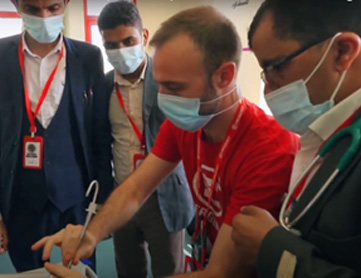 Paramedics receiving training under the ECHO-funded WHO programme.“The refrigerators we were using were old and worn out,” he said. “We also received a new frozen plasma refrigerator, which is needed for burn-related injuries. This support has meant a great deal to our hospital.”
Paramedics receiving training under the ECHO-funded WHO programme.“The refrigerators we were using were old and worn out,” he said. “We also received a new frozen plasma refrigerator, which is needed for burn-related injuries. This support has meant a great deal to our hospital.”
Mohammed Abdulwadood, a paramedic in Sa’dah governorate, said the training he and other paramedics received from WHO last year was “extremely beneficial,” especially because “we were lacking information in some areas.”
“We learned to use the Ambu bag (manual resuscitator) to stabilize patients,” he said. “We learned first aid procedures for accidents and injuries in the context of conflict and emergencies. The training provided us with practical as well as theoretical knowledge.”
In the past seven years, war and economic crisis have deepened Yemen’s humanitarian needs and devastated its health care infrastructure and services.
The majority of Yemen’s 30 million people lack basic necessities and services. More than 20 million have inadequate or no access to health care, while over 15 million Yemenis lack access to safe drinking water and sanitation, and about 16.2 million are food insecure.
Around 4 million Yemenis are internally displaced persons (IDPs), living in even worse conditions. Meanwhile, only about half of the country’s health facilities are fully operational due to the conflict and economic decline.
“ECHO is supporting our assistance to emergency and trauma services in Yemen because the need for them is so extreme,” said Dr Adham. “ECHO is providing WHO with vital financial aid as we do everything in our power to relieve the immense suffering in Yemen.”
Saving Yemeni lives through malaria education and outreach
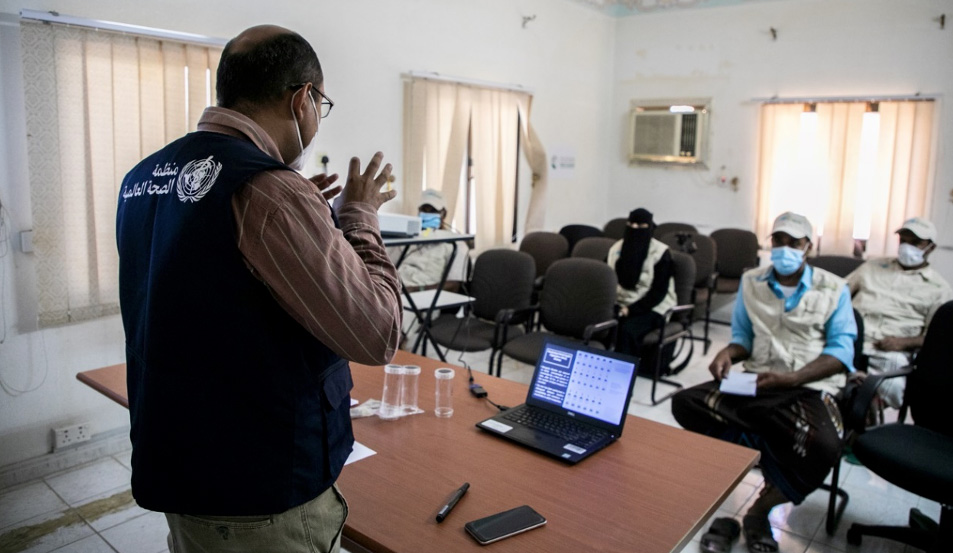
9 May 2022 - For the past several years, Yemen has been described as the “world’s worst humanitarian crisis” due to its protracted war and subsequent economic collapse. This has only been compounded by the COVID-19 pandemic and the spread of other diseases. In response to the country’s acute and tragic health outcomes, the World Health Organization (WHO), with funding from the King Salman Humanitarian Aid and Relief Centre (KSRelief), is supporting the health system throughout Yemen, including national efforts to prevent and control the spread of malaria and dengue fever.
The program’s implementation began in the southern governorates in October of 2020. Twenty-five volunteers were selected from each district to attend a training course, where they were taught how to detect malaria, diagnose it, treat it, and care for infected patients.








